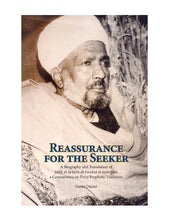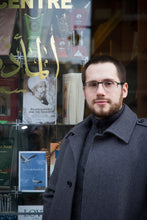The texts of this series record the lives and penetrating insights of three twentieth-century spiritual giants of Cairo. This timely series is an effort to make their wisdom and profoud messages available to contemporary spiritual aspirants.
Volume One From:
The Spiritual Luminaries of Twentieth-Century Cairo
Book1: Reassurance for the Seeker; A Biography and Translation of Salih al-Jafaris al-Fawaid al-Jafariyya, a Commentary on Forty Prophetic Traditions
Book 2: A Life in Praise of God: An Annotated Translation of Abd al-Halim Mahmuds Autobiography, Hadih hayati l-hamdu li-Llah
Book 3: In the Prophet's Footsteps: The Life and Teachings of a Sufi Hadith Master Muhammad al-Hafiz al-Tijani
This is again such an extraordinary work. What I love is that it provides a glimpse into the august scholarly and spiritual traditions of Islam carried forth into our day. Some people may have concluded that the saints and sages of Islam ended with all those names with whom we are most familiar - Ghazali, Jilani, Rumi and so on. It is important to understand that the knowledge and spiritual dephth reached in past centuries and celebrated in so many books, in fact, has and does continue into the present day. Otherwise, it would not be eternal Truth.
This volume is a unique collection of forty Prophetic Traditions distinguished by their focus on the spiritual journey of drawing nearer to God, as explicated by Salih al-Jafari, one of the most celebrated teachers of al-Azhar, Islam's leading institution of religious knowledge (939 CE til now) and most authoritative voice. In an age in which people increasingly search for Truth, but are confused by opposing trends and controversies, the author's indisputable scholarship, wisdom, and spiritual insight help guide, inspire, and reassure the modern reader. This book includes a detailed biography of the shaykh, a translation of al-Jafari's commentary, al-Fawaid al-Jafariyya, as well as an illumiating treatise by Ahmad b. Idris, one of his foremost teachers, on a hadith that concisely summarizes the spiritual nature of the Prophet Muhammad. In clear and illuminating text, the book deals with matters relating to the nature of spiritual experience, nearness to and friendship with God, as well as death and the afterlife.
Shaykh Salih al-Jafari was one of the most famous scholars of the Azhar, the Muslim world's premier institution of religious learning and its most authoritative voice, in the 20th Century. He was also the imam of its mosque and a famous teacher and spiritual guide. He authored many works on Islamic jurisprudence and spirituality. He was born in 1910 in the Sudan; he arrived in Cairo at the age of twenty to study at al-Azhar, where he obtained the highest degree at the time - the Alimiyya. He then taught in al-Azhar Mosque and in 1953 earned a PhD from the faculty of Shari a. He became the imam of al-Azhar Mosque and was known for his Friday lessons, which were popular and well-attended. he wa the founder of the Sufi order, al-Jafariyya al-Ahmadiyya al-Muhammadiyya, which is active in education and social work and has followers around the world. Shaykh al-Jafari wrote approximately fifteen works on various Islamic sciences, edited many others, and compased twelve volumes of petry. He died in Cairo in 1979.
"Shaykh Salih al-Jafari is the Scale of the Scholars for they are to be measured according to him!"
-Alawi al-Maliki, prominent twentieth-century Meccan scholar
Table of Contents
Foreword xi
Translator’s Introduction xv
Shaykh Ṣāliḥ al-Jaʿfarī: a Biography 1
The Way of Ibn Idrīs 1
Spiritual Successors 16
Ṣāliḥ al-Jaʿfarī the Student 20
Ṣāliḥ al-Jaʿfarī the Teacher 29
The Flood of Knowledge 38
Ṣāliḥ al-Jaʿfarī the Spiritual Guide 42
The Jaʿfariyya aḥmadiyya Muḥammadiyya 48
Social activity 50 the Works of al-Jaʿfarī 55
Jaʿfarī Lessons from the Light of the Prophetic Traditions 71
Translator’s Note 73
Introduction 75
Ḥadīth 1: Love 77
Ḥadīth 2: Drawing Near 84
Ḥadīth 3: God’s Friends 87
Ḥadīth 4: God’s Fortress 89
Ḥadīth 5: Under his Shade 93
Ḥadīth 6: Fear and Hope 96
Ḥadīth 7: Deep Understanding 103
Ḥadīth 8: Circles of Knowledge 105
Ḥadīth 9: Prayer 108
Ḥadīth 10: The Joy in Prayer 110
Ḥadīth 11: Miracles 113
Ḥadīth 12: The Prophets are Alive 116
Ḥadīth 13: The Two Graves 126
Ḥadīth 14: The Destined Abode 130
Ḥadīth 15: Visiting Graves 133
Ḥadīth 16: Greeting the Dead 135
Ḥadīth 17: Reciting Yā sīn for the Dead 137
Ḥadīth 18: Charity for the Dead 139
Ḥadīth 19: Reaping Rewards after Death 144
Ḥadīth 20: Raising the Servant’s Degree 147
Ḥadīth 21: Charity 149
Ḥadīth 22: The Seeds of Goodness 157
Ḥadīth 23: Protection from the Fire 163
Ḥadīth 24: The Traits of the Felicitous 168
Ḥadīth 25: Sacred Matters 172
Ḥadīth 26: Visiting the Righteous 176
Ḥadīth 27: Reverence, Mercy, Recognition 178
Ḥadīth 28: Seeking God through Service 180
Ḥadīth 29: On Account of an Animal 184
Ḥadīth 30: A Garden of Paradise 186
Ḥadīth 31: Blessings upon the Prophet 189
Ḥadīth 32: The Sleep of the Prophets 191
Ḥadīth 33: Visions of the Prophet 193
Ḥadīth 34: The People of Remembrance 195
Ḥadīth 35: Circles of Remembrance 198
Ḥadīth 36: Polishing the Heart 201
Ḥadīth 37: Satan’s Whispers 203
Ḥadīth 38: Formulas of Remembrance 206
Ḥadīth 39: Dealing with God, the Self, and Others 208
Ḥadīth 40: The three Mosques 211
Appendix 215
Introduction 217
The Ḥadīth of the Muḥammadan Sunna 221
Bibliography 235
Illustrations
Shaykh al-Jaʿfarī’s friday lesson at al-Azhar 60–63
Shaykh Muḥammad Bakhīt al-Muṭīʿī (d. 1935) 63
Shaykh Muḥammad Ḥabībullāh al-Shinqīṭī (d. 1944) 64
“Shaykh al-islām” Yūsuf al-Dijwī (d. 1946) 65
Shaykh Muḥammad al-sharīf al-Idrīsī (d. 1937) 66
Shaykh Muḥammad b. ʿalī l-Sanūsī (d. 1859) 67
Shaykh al-Jaʿfarī with Shaykh ʿabd al-Ḥalīm Maḥmūd (d. 1978) 68
Shaykh ʿAbd al-Ghanī (d. 2012) 69
The fruits of spiritual seclusion are wondrous and strange! At the beginning of the path I had a 1000-count masbaha (prayer beads), and stayed inside my seclusion room for ten days, but nothing happened, and true stillness did not enter my heart. But on the tenth day, I saw wonders and marvels- and that lasted for a minute. Then I knew (my Lord). After that my father gave me up for the sake of religious scholarship, and I came here (from Sudan to the Azhar).
The best thing is relgious knowledge. The Prophetic gathering is the gathering of religious knowledge. The ant asks God's forgiveness for the scholar, and the fish asks forgiveness for the scholar. The best thing on the face of the Earth is the teaching of religious kowledge. I chose it for myself, and God chose it for me. If you become a Friend of God, that is for your own benefit; if you pray, that is for your own benefit. If you are in seclusion, that is for your own benefit. The one who enters into seclusion is like one who bring a roasted sheep and enters his room to feast on it. Such is the remembrance of God. As for religious knowledge, it is for the creation of God most high, and out of love for the sake of God, and good doing for the sake of God.
On the authority of Abdullah ibn Umar (may God be pleased with him) who said: "O Messenger of God, which of the people is most beloved to God?"
He (may God bless him and grant him peace) said: "The most beloved of people to God is the one who is of most benefit to the people."
Religious knowledge feeds the souls, just like food nourishes the bodies. It is said that one of the Sufis entered the seclusion room for rememberance, but heard a voice say to him: 'This is not what I created for you! Go out and benefit the people by your knowledge!' When the Prophet (may God bless him and grant him peace) would come to his family, he would sit with them and teach them the Qur'an and teach them relgious knowledge. his gathering - may God bless him and grant him peace - was a gathering of relgious knowledge, and that is the best of gatherings.
-Shaykh Salih al-Ja'fari, The Friday Lessons, v.9
Samer Dajani




